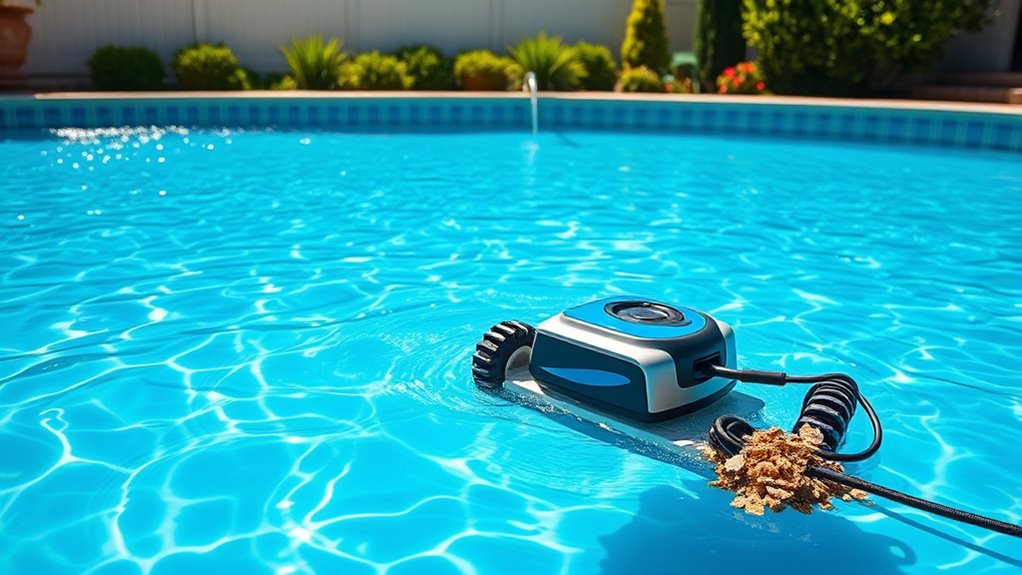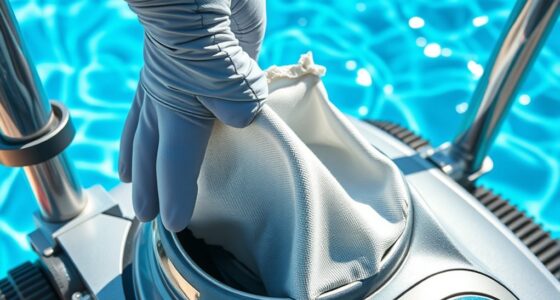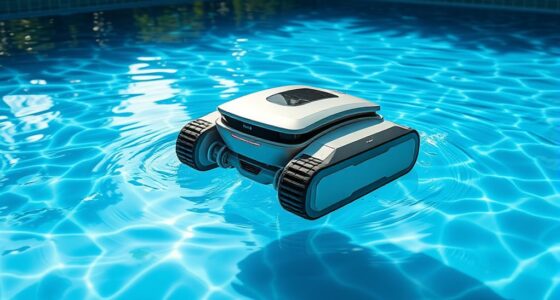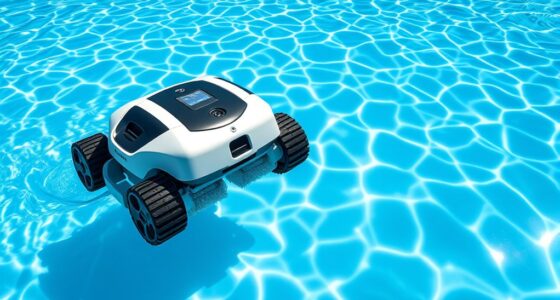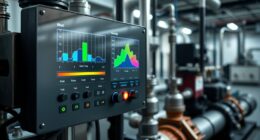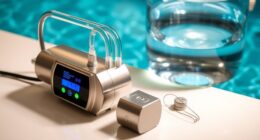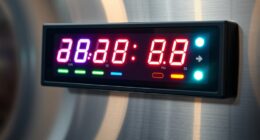Many people believe automatic pool cleaners are perfect replacements for manual maintenance, but they’re not. They don’t adjust chemical levels or handle all debris types, so regular testing and cleaning are still needed. Not all cleaners work well with every pool size, shape, or debris, and they require setup and periodic maintenance. They also don’t clean the pool instantly or only work effectively when used daily. Keep going to discover how to get the most from your pool cleaner.
Key Takeaways
- Automatic pool cleaners do not replace manual chemical balancing; regular testing and adjustments are still necessary.
- They don’t clean edges or hard-to-reach areas as effectively, especially in irregularly shaped pools.
- Faster cleaning times depend on pool size, debris load, and cleaner technology, not just the cleaner’s speed.
- Over-reliance on automatic cleaners without maintenance can reduce effectiveness and lifespan.
- Running cleaners too frequently isn’t necessary and may cause unnecessary wear or water imbalance.
Automatic Pool Cleaners Are Complete Replacements for Manual Maintenance

Many people believe that automatic pool cleaners can fully replace manual maintenance, but this isn’t entirely accurate. While these devices efficiently remove debris, they don’t handle all aspects of pool care. You still need manual intervention for tasks like chemical balancing, which ensures water remains safe and clear. Automatic cleaners don’t adjust pH levels or chlorine, so you must regularly test and tweak chemicals yourself. Relying solely on the cleaner can lead to overlooked imbalances that cause algae growth or cloudy water. Proper maintenance involves a combination of automated cleaning and manual efforts. Additionally, filter replacement is necessary to maintain the cleaner’s effectiveness over time. This ensures your pool stays in excellent condition, with clean water and balanced chemicals. Regular pool testing is essential to detect issues early and maintain optimal water quality. Moreover, understanding how bioluminescent fungi emit light can inspire innovative bioluminescent applications in scientific research. Automatic cleaners are helpful, but they’re not a complete substitute for your regular, hands-on pool care routine.
They Work Equally Well for All Pool Sizes and Shapes

Not all automatic pool cleaners perform equally well in every pool shape or size. The shape can affect how effectively the cleaner navigates, while the size determines how long cleaning takes. Understanding these factors helps you choose the right cleaner for your pool. Additionally, the type of debris commonly found in your pool can influence the effectiveness of certain models, especially when considering cleaning efficiency and storage conditions. Moreover, the personal development industry emphasizes tailored approaches, highlighting that a one-size-fits-all solution rarely applies to complex systems like pool cleaning.
Pool Shape Impacts Efficiency
While automatic pool cleaners are designed to work across various pool shapes and sizes, their efficiency can actually be influenced by these factors. The pool shape plays a significant role in cleaning efficiency because some shapes create hard-to-reach areas or irregular surfaces. For example, a rectangular pool with straight sides allows for more thorough coverage, while freeform or kidney-shaped pools might leave corners or edges less clean. The cleaner’s navigation pattern can be affected, leading to missed spots or longer cleaning times. To maximize efficiency, choose a cleaner suited for your pool’s shape, ensuring it can navigate all areas effectively. Understanding how your pool shape impacts cleaning efficiency helps you select the right automatic pool cleaner for optimal results.
Size Influences Cleaning Time
Automatic pool cleaners are designed to handle pools of all sizes and shapes with consistent efficiency. While larger pools might seem to take longer, the cleaning duration depends more on the pool surface area than size alone. Larger pools often have more surface to cover, but modern cleaners are optimized for efficiency. Keep in mind:
- The cleaner’s speed and navigation affect how quickly it covers the pool surface.
- Pool shape can influence the cleaning time, especially in irregular or complex designs.
- Overall, the cleaning duration remains relatively consistent across different pool sizes, thanks to advanced technology.
- Cleaning efficiency is continually improved in newer models, allowing for faster and more thorough coverage regardless of pool dimensions.
Regardless of your pool’s size, a quality automatic cleaner works efficiently, ensuring thorough cleaning without markedly increasing your wait time.
All Automatic Cleaners Are Suitable for Every Type of Debris

Many automatic pool cleaners are marketed as versatile devices that can handle all types of debris, but in reality, they may not be equally effective for every kind of mess your pool encounters. Debris diversity in pools includes leaves, dirt, algae, and small particles, each requiring different cleaning approaches. Not all cleaners are compatible with every surface; for example, some work best on smooth surfaces like vinyl or fiberglass, while others are designed for textured finishes. If a cleaner isn’t suited for your pool’s surface or specific debris, it might leave debris behind or cause damage. To get the best results, you need a cleaner that matches your pool’s surface compatibility and can handle the variety of debris you typically face. Additionally, understanding the types of debris your pool accumulates most often can help you select a cleaner that effectively addresses those specific challenges improving indoor air quality. Incorporating advanced cleaning technology can further enhance debris removal efficiency and reduce manual maintenance. Recognizing the importance of effective debris removal can also prevent costly repairs and ensure your pool remains in optimal condition, especially when considering surface compatibility to avoid damage. Using a cleaner with adaptive features can help tackle different debris types more effectively, ensuring a thorough clean every time.
They Do Not Require Any Setup or Regular Maintenance

Despite common misconceptions, automatic pool cleaners do require some setup and ongoing maintenance to operate effectively. The setup complexity varies depending on the model, but it’s generally straightforward. Once installed, regular maintenance is essential to keep your cleaner running smoothly. The maintenance frequency depends on usage and debris levels, but neglecting it can reduce efficiency. Here are key points:
- Check and clean filters weekly to prevent clogs.
- Inspect brushes and wheels monthly for wear and tear.
- Store the cleaner properly during off-season to prolong lifespan.
- Understanding automatic pool cleaner features can help optimize maintenance routines. Additionally, familiarizing yourself with system components can enhance troubleshooting and longevity. Regularly monitoring robotic cleaning technology can also improve overall performance. Moreover, proper maintenance ensures that the spare parts remain in good condition, reducing the need for costly replacements. Being aware of debris accumulation levels can help prevent clogging and maintain optimal operation. While they’re designed for convenience, automatic pool cleaners aren’t completely maintenance-free. Proper setup and routine upkeep assure ideal performance and durability over time.
They Can Clean a Pool in a Very Short Time Frame
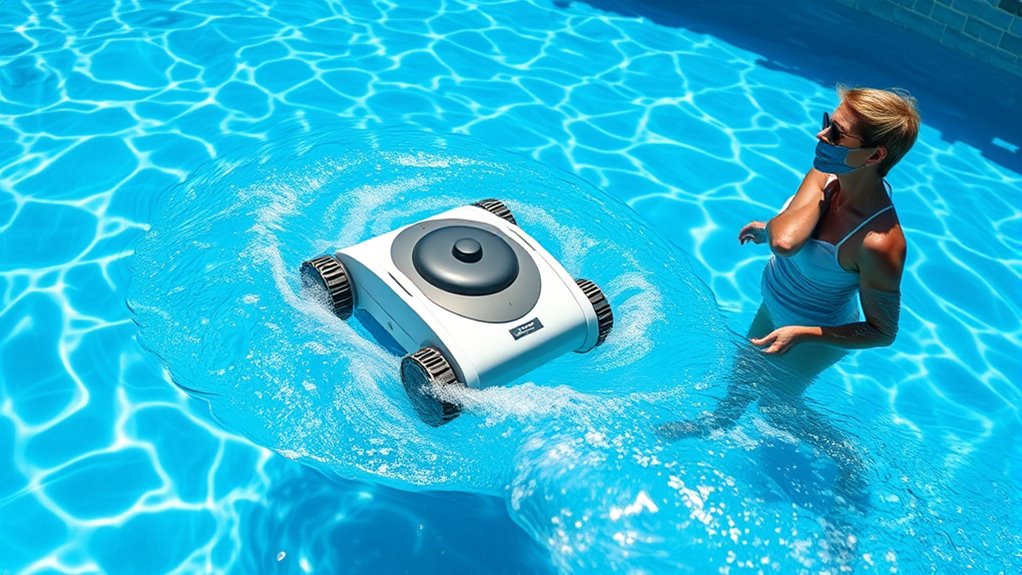
Many assume automatic pool cleaners can finish cleaning quickly, but their speed depends on several factors. The size of your pool and the type of debris also play a big role in how long the process takes. Understanding these points helps set realistic expectations for cleaning times. Additionally, the type of cleaner significantly influences cleaning efficiency and duration. Proper maintenance and calibration of your pool cleaner can further optimize its performance, ensuring more effective and quicker cleaning sessions. Regularly inspecting and servicing your equipment can prevent breakdowns and maintain optimal efficiency, especially as advancements in AI-driven solutions continue to influence pool cleaning technology. Incorporating crochet techniques into pool accessories or decorations is also a creative way to personalize your pool area and enhance the overall aesthetic.
Cleaning Speed Varies
Automatic pool cleaners can often complete their job much faster than you might expect. However, cleaning speed varies based on several factors, affecting their overall cleaning efficiency.
Here are three key points to understand about speed variation:
- Model differences: Some cleaners are designed for rapid coverage, while others focus on thorough cleaning, impacting overall speed.
- Pool condition: A clean, smooth surface allows faster movement, whereas debris or algae can slow down cleaning.
- Environment factors: Obstacles or water flow can influence how quickly and efficiently a cleaner operates.
While they can work quickly, remember that cleaning efficiency depends on these elements. Faster doesn’t always mean better, but understanding speed variation helps you choose the right cleaner for your pool.
Pool Size Matters
A small pool can be cleaned in just a fraction of the time it takes to tidy a larger one. The pool’s size directly impacts how quickly an automatic cleaner works. Shallow pools with less depth are easier to navigate, reducing cleaning time. Conversely, deeper pools require more effort because the cleaner must cover a larger surface area and contend with varying water depths. Water temperature also plays a role; warmer water tends to loosen debris, making it easier for the cleaner to pick up dirt efficiently. Larger pools demand more time regardless of your cleaner’s power, but understanding your pool’s size and depth helps set realistic expectations. Keep in mind that a smaller, shallower pool allows for faster, more thorough cleaning sessions.
Debris Type Influence
When debris in your pool is light and easy to pick up, your cleaner can finish the job quickly. The debris type considerably influences debris removal speed. For example, small, lightweight particles are easier to collect than larger, heavy debris.
Consider these factors:
- Debris specificity – cleaners target certain debris types better than others.
- Size and weight – smaller, lighter debris clears faster.
- Surface adhesion – loose debris floats, making removal quicker; stubborn debris clings longer.
Automatic Pool Cleaners Are Only Effective When Used Daily
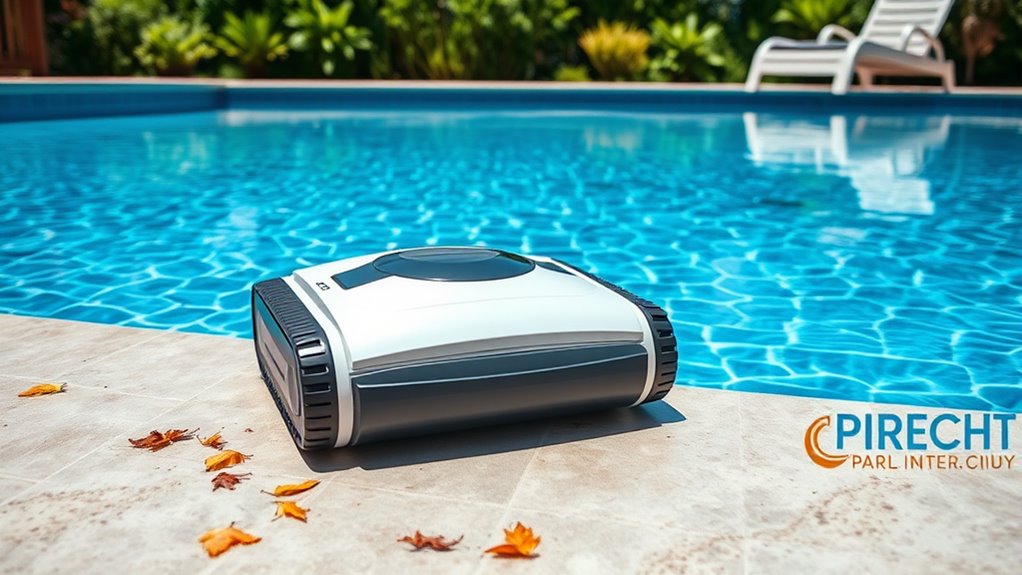
Many assume that automatic pool cleaners must be run daily to be effective, but that’s not necessarily true. While regular use helps maintain cleanliness, overdoing it can lead to unnecessary wear or disturbance of the chemical balance. You don’t need to run your cleaner every day if you manually intervene when needed. Keeping the chemical balance in check reduces debris accumulation, meaning the cleaner can work efficiently with less frequent runs. Additionally, proper skimming and brushing can lessen the workload on your automatic cleaner. Focus on maintaining a healthy chemical balance and only use your cleaner when necessary. This approach extends your cleaner’s lifespan and keeps your pool water clear without the need for daily operation.
Frequently Asked Questions
Can Automatic Pool Cleaners Handle Algae or Bacteria Cleanup?
Automatic pool cleaners are great for removing debris, but they don’t handle algae removal or bacteria control on their own. You’ll need to manually treat your pool with appropriate chemicals like algaecides and disinfectants. While these cleaners help keep your pool clean, maintaining proper chemical balance is essential for effective algae removal and bacteria control, ensuring your pool stays safe and healthy for swimming.
Are Automatic Cleaners Compatible With All Pool Filter Systems?
Imagine your pool as a delicate dance, and your cleaner as the lead. Not all automatic pool cleaners are compatible with every pool filter system; some require specific setups. Check pool filter compatibility before purchasing, as mismatched systems can hinder performance. Keep in mind, maintenance requirements vary — some cleaners need regular filter checks to keep the dance smooth. Choosing the right fit guarantees your pool stays pristine and trouble-free.
How Noisy Are Automatic Pool Cleaners During Operation?
Automatic pool cleaners are generally quiet during operation, but noise levels can vary by model. Most produce minimal operational sounds, often comparable to a gentle hum or soft whirring, so you probably won’t be disturbed while they work. Higher-end models tend to operate more quietly, making them suitable even for peaceful evenings. Overall, you’ll find that the noise levels are low enough not to interfere with your poolside relaxation.
Do Automatic Pool Cleaners Require Professional Installation?
Think of installing an automatic pool cleaner as opening a treasure chest—you might face some installation challenges, but the reward is a sparkling pool. You won’t need professional help for most models; many are designed for easy setup. Keep in mind, regular maintenance requirements are minimal, making this a hassle-free way to keep your pool pristine. With a little effort, you’ll enjoy a cleaner pool without the stress.
What Are the Common Troubleshooting Issues With Automatic Pool Cleaners?
When troubleshooting your automatic pool cleaner, start with simple maintenance tips like checking for tangled debris or clogged filters. Make certain the brushes and tracks are clean and functioning properly. Monitor battery life, as reduced power can hinder cleaning. Regularly inspect and replace worn parts to keep it running smoothly. If issues persist, consult the user manual or contact customer support to prevent further problems and extend your cleaner’s lifespan.
Conclusion
Don’t buy into the myth that automatic pool cleaners are a one-size-fits-all solution or require no effort. They’re helpful tools, but they’re not magic bullets. Regular maintenance and proper setup make all the difference. Remember, you can’t just set it and forget it—think of it as a partnership. With a little effort, you’ll keep your pool sparkling and ready for swim time. Don’t let misconceptions trip you up!
